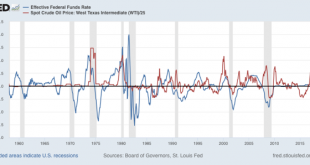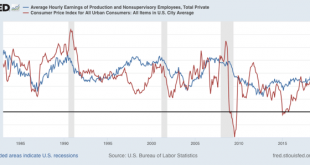The chart of the decade Today doesn’t just mark the end of 2019, but the end of the 2010’s as well. So it’s only suitable that I post the one chart that I think most explains the economy over the past 10 years. In terms of public policy, that chart would be of the continual explosion of income and wealth inequality, particularly at the very top 0.1% or 0.01% of the distribution. But in terms of explaining why the economy has chugged along at roughly 2%...
Read More »Thiessen Balances His Policy Defense Of Trump
Thiessen Balances His Policy Defense Of Trump Several days ago I posted on Marc A. Thiessen’s defense of 10 policies by Trump in WaPo. I must now credit him with today on New Year’s Eve in the same venue publishing a column “The 10 worst things Trump did in 2019.” Good for him, some balance after all. I agree these are all bad things, although I disagree with some of his analysis of them, with a few caveats especially on a couple of the foreign...
Read More »A response to Kevin Drum: for wages and inflation, it’s all about the price of gas
A response to Kevin Drum: for wages and inflation, it’s all about the price of gas Last week Kevin Drum had the following inquiry: [H]ow is it that wages can go up but overall inflation remains so subdued? That seems to be the real disconnect here. During the dotcom boom, wages went up but inflation remained around 3 percent. During the housing bubble, wages didn’t go up and inflation remained around 3-4 percent. Right now, wages are going up but...
Read More »The Unreasonableness Of The Policy Defense Of Trump
The Unreasonableness Of The Policy Defense Of Trump In today’s (12/27/19) Washington Post, regular Trump defender, Mark A. Thiessen published a column, “The 10 best things Trump did in 2019” This turns out to be mostly things either not worth defending or Thiessen, who simply never criticizes Trump, misrepresenting situations. Here they are. 10. “He continued to deliver for the forgotten Americans.” This amounts to unemployment continuing to decline,...
Read More »Trump Brags About Record Defense Spending
Trump Brags About Record Defense Spending Niv Elis covers the latest in the Trump fiscal fiasco: President Trump on Friday signed two spending packages totaling $1.4 trillion, averting a government shutdown at midnight. The bills included all 12 annual appropriations bills for the 2020 fiscal year that started Oct. 1. They also included a slew of tax cuts, extending expiring and expired tax breaks and eliminating other taxes that amount to an additional...
Read More »Review: Secondhand
by David Zetland (originally published at One-handed Economist) Review: Secondhand I read this 2019 book at record speed due to its breezy (“magazine”) tone and discussion of one of my favorite passions: reusing old stuff. A few years ago Adam Minter wrote Junkyard Planet about the trash trade, but many readers told him about how they reused stuff rather than about their trash. Their passion led to this book (subtitle: Travels in the New Global Garage...
Read More »The endowment effect and the taxation of wealth
The endowment effect and the taxation of wealth As you may recall, I am reading the histories of a number of past Republics which have had various levels of success. Without getting too far ahead of myself, it appears that one constant is that, once plutocratic oligarchies are entrenched, they will refuse to yield power or money, even to the point of destroying democratic or republican institutions. In other words, David Frum‘s observation that “If...
Read More »How Long Will US Foreign Net Income Dark Matter Continue?
How Long Will US Foreign Net Income Dark Matter Continue? The United States became a net foreign debtor in 1985. With current account deficits every year since then, net foreign indebtedness has steadily increased since and reached a reported total of -$10.56 trillion as of Sept. 30 this year, a substantial total. However, while many have long predicted that this mounting net foreign indebtedness would eventually lead to the US also having a net negative...
Read More »What’s behind the subprime consumer loan implosion
Via Naked Capitalism comes an explanation of what income inequality looks like in the US. It stands in contrast to the Bloomberg article pointed to by Yves in her introduction. I pulled the quotes with a non-economic person in mind. THE WOLF STREET REPORT transcript of podcast by Wolf Richter. Subprime doesn’t mean poor or uneducated. Subprime means having a credit score below 620… (Dan here) For example: Aggressive subprime lending went into...
Read More »The Current State of the U.S. Dairy Industry
The Current State of the U.S. Dairy Industry I had to endure a discussion of the plight of American dairy farmers where Trump’s trade policies were somehow to blame. Stephanie Mercier confirmed some of the facts: According to data reported by the National Farmers Union (NFU), the average dairy farm has shown a positive net income only once in the last decade, in 2014. In 2018, the average value of production exceeded the total cost of producing each...
Read More » Heterodox
Heterodox


